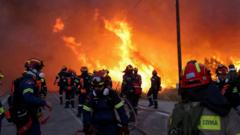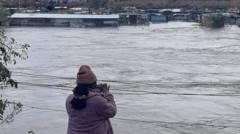Shahbaz Ali, a ride-hailing motorcycle driver, navigates the oppressive heat and power outages in Karachi, emphasizing the struggle for survival rather than living a comfortable life amid escalating climate challenges.
Surviving the Scorch: Life in Karachi's Scorching Heat

Surviving the Scorch: Life in Karachi's Scorching Heat
A personal account of life under extreme heat in Karachi, Pakistan, sheds light on the resilience and challenges faced by everyday people.
In the sweltering environment of Karachi, Pakistan, extreme temperatures have turned daily survival into a grim task. At just 8 a.m., the sun beats down mercilessly, and for Shahbaz Ali, a 32-year-old ride-hailing motorcycle driver, the day starts drenched in sweat. Sleep deprivation from frequent power outages exacerbates his battle against the sweltering heat.
During his arduous 12-hour shifts, temperatures soar above 104 degrees Fahrenheit (40 degrees Celsius), while the high humidity near the Arabian Sea drives the heat index beyond 115 degrees. “It feels like living in a furnace,” Ali remarked as he maneuvered through Karachi's congested streets. His stories of hardship reflect a harsh routine dictated by economic necessity: “If I stop working, my family won’t eat.”
Ali's experience is a stark testament to how climate change is reshaping life in Karachi. The city, known as Pakistan's largest metropolis, faces unprecedented challenges as the climate crisis deepens. Initiatives needed to combat extreme weather conditions remain largely inadequate, forcing residents like Ali to adapt and endure relentless adversities.
The narrative catches a glimpse of how families cope day-to-day, utilizing makeshift solutions like rechargeable emergency lights for children’s schooling during outages. Through Ali’s eyes, the story unfolds around the resilience of people who are caught in a climate bind, ultimately revealing the bittersweet reality of living in a climate-challenged world—enduring rather than truly living.






















